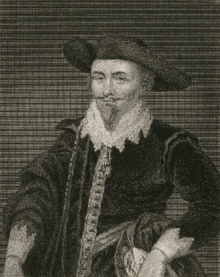Richard Brathwait | |
|---|---|
 | |
| Born | 1588 near Kendal, Cumberland |
| Died | 1673 (aged 84–85) |
| Nationality | English |
| Occupation | Poet |
| Notable work | Drunken Barnaby's Four Journeys |
Richard Brathwait or Brathwaite (1588 – 4 May 1673) was an English poet.
YouTube Encyclopedic
-
1/2Views:570748
-
Computer : An Introduction
-
SUPER TET|| INFORMATION TECHNOLOGY ||GHATNA CHAKRA PUBLICATION
Transcription
Life
Brathwait was born at Burnishead, near Kendal. He entered Oriel College, Oxford in 1604, and remained there for some years, pursuing the study of poetry and Roman history. He moved to Cambridge to study law at the university and afterwards to London to the Inns of Court. His father, Thomas, died in 1610, and Brathwait went down to live on the estate he inherited.[1] He was married[2] at Hurworth in County Durham, 4 May 1617, to Frances, daughter of James Lawson, of Nesham Abbey.
In 1633 his wife died, and in 1639 he married again. His only son by this second marriage, Sir Strafford Brathwait, was killed at sea.[1] Brathwait is believed to have served with the Royalist army in the Civil War.

He was the author of many works of very unequal merit, of which the best known is Drunken Barnaby's Four Journeys, which records his pilgrimages through England in rhymed Latin (said by Southey to be the best of modern times), and doggerel English verse. The English Gentleman (1631) and English Gentlewoman are in a much more decorous strain. Other works are The Golden Fleece (1611) (poems), The Poet's Willow, A Strappado for the Devil (a satire), and Art Asleepe, Husband?
His 1613 book The Yong Mans Gleanings contains the first known use of the word "computer"; he used the word to refer to an "arithmetician".[3]
An extract from both Drunken Barnaby and his “epitaph to Frances, (his wife)” appears in The Bishoprick Garland by (Sir) Cuthbert Sharp.
Notes
- ^ a b One or more of the preceding sentences incorporates text from a publication now in the public domain: Chisholm, Hugh, ed. (1911). "Brathwait, Richard". Encyclopædia Britannica (11th ed.). Cambridge University Press.
- ^ "The Bishoprick Garland page 39" (PDF).
- ^ "Richard Braithwaite coined the phrase 'computer'". Centre for Computing History. Retrieved 21 November 2020.
References
 This article incorporates text from a publication now in the public domain: Cousin, John William (1910). A Short Biographical Dictionary of English Literature. London: J. M. Dent & Sons – via Wikisource.
This article incorporates text from a publication now in the public domain: Cousin, John William (1910). A Short Biographical Dictionary of English Literature. London: J. M. Dent & Sons – via Wikisource.
Further reading
- Black, M. W. (1928). Richard Brathwaite: an account of his life and works (PhD thesis). University of Pennsylvania.
- Reed, Barbara A. (2000). Richard Brathwait: a case study of publishing and conduct literature in seventeenth-century England (M.A. thesis). Arizona State University.
- Sanders, Julie (2009) [2004]. "Brathwaite, Richard (1587/8–1673)". Oxford Dictionary of National Biography (online ed.). Oxford University Press. doi:10.1093/ref:odnb/3290. (Subscription or UK public library membership required.)
External links
- Richard Brathwait at PoemHunter
